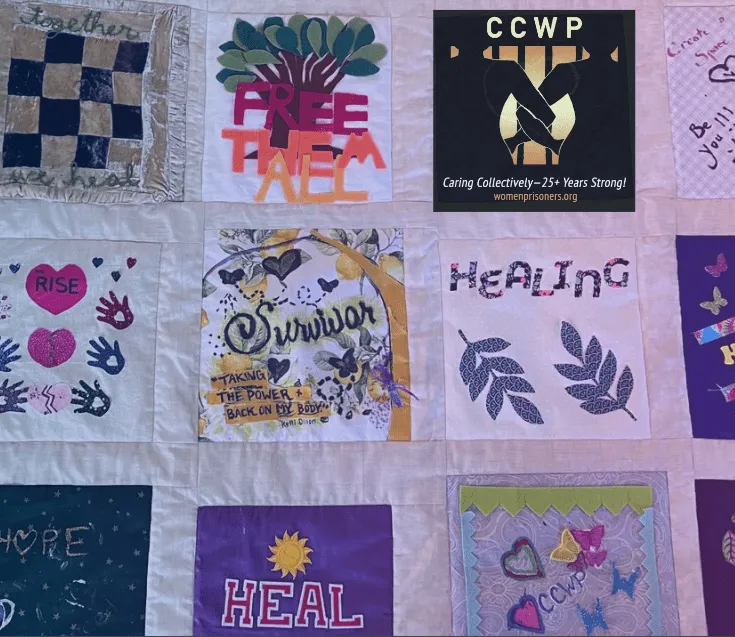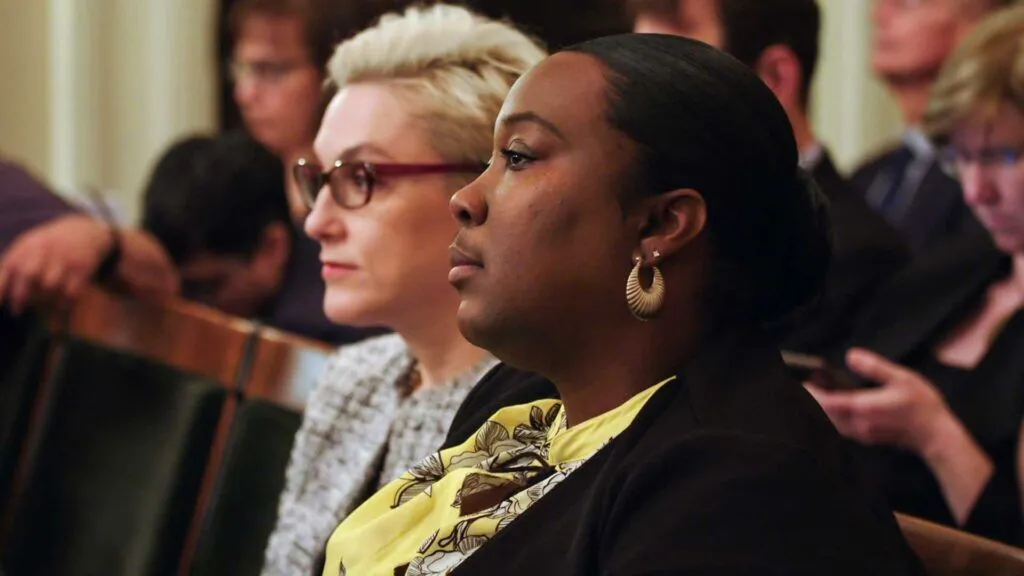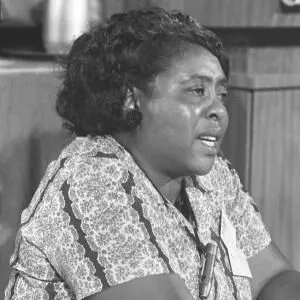Six women unveiled a quilt earlier this year they called “Together We Rise! Together We Heal!” honoring the nearly 600 survivors of forced sterilization in California state prisons.
One of those women—Kelli Dillon—was herself sterilized without her knowledge by a prison doctor and began to experience menopause in 2001, while in her early 20s. She shared this with individuals at the unveiling ceremony, speaking to the pain this medical violence caused her.
The quilt, created with fabric scraps inside and outside of prisons and coordinated by activist Linda Evans of the California Coalition of Women Prisoners, visualizes the intense violence that many incarcerated women, especially incarcerated women of color, faced and continue to face. It connects to a much longer history of how forced sterilization is and was used to sterilize disabled women and women of color across the United States over the past century.

In many ways, the institutionalization and pathologization of disability in the U.S. mirrors how incarcerated individuals are and were stripped of their reproductive rights.
As the country grapples with the deadly aftermath of the Supreme Court overturning Roe v. Wade, these six women remind people that medical violence is and has been permissible in this country. The quilt’s message also serves as a reminder of the continuation of early 20th century efforts to sterilize women, whether that’s because of disability, race, religion or ethnicity, and to ultimately serve white supremacist ends.
During the Social Purity and Eugenics Movements of the late 19th and early 20th centuries, eugenicists sought to preserve and uplift a pure white, Protestant race by “protecting” white women’s virginity and encouraging them to have children. (Pronatalists got their start during this time as well.) At the same time, they were forcibly sterilizing women of color, especially Black and Native women, poor women and disabled individuals.

Alongside social campaigns that outlawed alcohol consumption, sex work and the distribution of contraception and “pornographic” materials through the mail—as well as xenophobic, paternalistic laws against a flood of Southern and Eastern European and Asian immigrants to the United States—these social purists fought for the passage of laws enabling doctors and institutions to forcibly sterilize people.
These laws took off in the early 20th century, around the same time that these purists campaigned for unsightly beggar ordinances that restricted disabled people from appearing in public.
This social experimentation and implementation of eugenics on a massive scale is perhaps best immortalized by Justice Oliver Wendell Holmes, Jr.’s official opinion for the U.S. Supreme Court in the case of Buck v. Bell. The 1927 case upheld the legality of state institutions forcibly sterilizing anyone “afflicted with an hereditary form of insanity or imbecility.” Central to the case was Carrie Buck, a poor white woman, who was sterilized at about the same age as Dillon. Holmes argued that “three generations of imbeciles are enough,” referring to Carrie’s mother Emma, Carrie herself, and her child Vivian.
Buck was not alone. Between the 1920s and the 1980s, thousands of women were forcibly sterilized, often without their knowledge, in an effort to reduce the population of people of color. The slang term “Mississippi appendectomy” refers to the forced sterilization of poor Black women, including civil rights activist Fannie Lou Hamer, as a reflection of wider racial medical violence.

In 2020, these histories were revisited as immigrants detained in the U.S. accused the facilities they were held in of forcibly sterilizing them.
Just last month, another case of forcible sterilization—which highlights one of thousands of Indigenous women and poor women in Peru under Alberto Fujimori’s government—was heard before the Inter-American Court of Human Rights in Guatemala City.
It wasn’t until 2013 that the practice of sterilizing incarcerated women as a form of birth control was outlawed in California.
In 2021, another law required the state to pay reparations; however, to this day, women are still denied access to their medical records and compensation on the claim that endometrial ablation procedures are not a form of birth control.
California is currently only one of three states that has created processes and has begun to pay reparations to people who have been forcibly sterilized. A group of researchers in Utah are pushing to become the next state to compensate people who were forcibly sterilized. At one time, Utah was the leading state for forced sterilization in the country, according to Axios‘ Erin Alberty.
However, the fight and the practice of forced or coerced sterilization of incarcerated women continues in the U.S. While the case Relf v. Weinberger outlawed the use of federal funding for involuntary sterilization, forced sterilization is still exercised in some correctional facilities. The true number of these cases and extent of this medical violence is difficult to quantify, as is the question of whether incarcerated individuals can and are providing informed consent to these procedures. Reparations are still difficult to access as some reparations committees do not consider reproductive procedures with fertility-reducing implications a form of intentional sterilization.
For disabled individuals, who still face exploitative systems of institutionalization and are denied marriage equality in the U.S., forced sterilization remains legal in some states where this is permissible in specific situations. As Julia Métraux wrote for Mother Jones earlier this year, most states still have laws on the books that permit doctors and institutions to sterilize disabled individuals where disabled individuals are held, sometimes against their will.
Just two months ago, Maria Elena Figueroa—a woman who fought against forced sterilization and one of 10 Mexican American plaintiffs to sue the Los Angeles County-USC Medical Center for forced sterilization—died. The case Madrigal v. Quilligan highlighted the impact of racism, medical abuse and language barriers on reproductive justice within the healthcare system. Figueroa gave birth to her daughter in 1971 and had her fallopian tubes tied without consent to the procedure. Instead, her husband gave consent and signed the form without her knowledge.
Although not incarcerated, Figueroa stood as an advocate for thousands of women grappling with this history of medical violence and for the growing awareness of these long-standing ramifications.
At the same time, many others have in the last three years turned to voluntary sterilization in the wake of Roe v. Wade being overturned to protect their health and reproductive rights.
